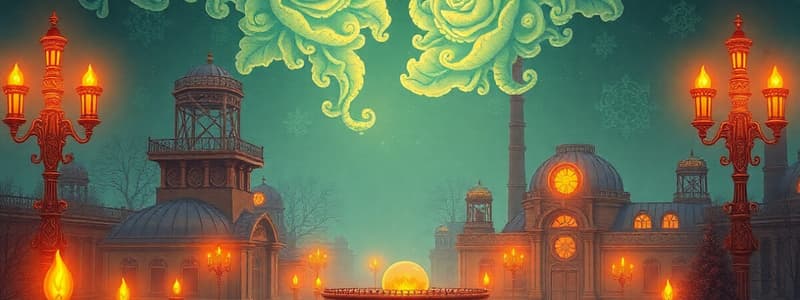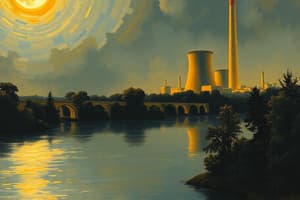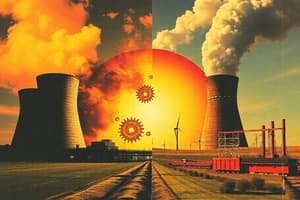Podcast
Questions and Answers
What is the primary process involved in the Sun's energy production?
What is the primary process involved in the Sun's energy production?
- Radioactive decay
- Nuclear fission
- Chemical reaction
- Nuclear fusion (correct)
What is the main consequence of the mass defect observed during nuclear fission?
What is the main consequence of the mass defect observed during nuclear fission?
- Release of massive energy (correct)
- Creation of new elements
- Formation of stable isotopes
- Decrease in radioactive isotopes
Which of the following statements about radioactive waste is true?
Which of the following statements about radioactive waste is true?
- It can be reused indefinitely.
- It is completely safe to handle.
- It can be radioactive for thousands of years. (correct)
- It remains harmless for only a few days.
What is a crucial component used in nuclear reactors to maintain the fission reaction?
What is a crucial component used in nuclear reactors to maintain the fission reaction?
What does Einstein's mass-energy equivalence equation demonstrate?
What does Einstein's mass-energy equivalence equation demonstrate?
How much energy can one fuel pellet of uranium produce compared to coal?
How much energy can one fuel pellet of uranium produce compared to coal?
What typically happens to uranium atoms during the fission process?
What typically happens to uranium atoms during the fission process?
What fundamental change occurs during nuclear fission?
What fundamental change occurs during nuclear fission?
What is the primary product of the fusion of two hydrogen atoms?
What is the primary product of the fusion of two hydrogen atoms?
Which of the following statements best explains nuclear energy production?
Which of the following statements best explains nuclear energy production?
What historical events significantly impacted the perception of nuclear energy globally?
What historical events significantly impacted the perception of nuclear energy globally?
In what type of nuclear reaction does matter get converted into energy?
In what type of nuclear reaction does matter get converted into energy?
How many countries currently operate nuclear reactors powered by nuclear energy?
How many countries currently operate nuclear reactors powered by nuclear energy?
What is the role of uranium in nuclear reactions?
What is the role of uranium in nuclear reactions?
What happens to the atomic structure during a nuclear reaction?
What happens to the atomic structure during a nuclear reaction?
Flashcards
Nuclear Energy
Nuclear Energy
Energy released from the nucleus of an atom
Nuclear Fission
Nuclear Fission
Splitting a large atom's nucleus
Nuclear Fusion
Nuclear Fusion
Combining small nuclei to form a larger one
Chemical Energy
Chemical Energy
Signup and view all the flashcards
Hydrogen to Helium
Hydrogen to Helium
Signup and view all the flashcards
Nuclear Power
Nuclear Power
Signup and view all the flashcards
Uranium to Plutonium
Uranium to Plutonium
Signup and view all the flashcards
Types of Nuclear Reactions
Types of Nuclear Reactions
Signup and view all the flashcards
Nuclear Fusion
Nuclear Fusion
Signup and view all the flashcards
Nuclear Fission
Nuclear Fission
Signup and view all the flashcards
Mass Defect
Mass Defect
Signup and view all the flashcards
Radioactive Waste
Radioactive Waste
Signup and view all the flashcards
Nuclear Power Plant
Nuclear Power Plant
Signup and view all the flashcards
Uranium-235
Uranium-235
Signup and view all the flashcards
Chain Reaction (Nuclear)
Chain Reaction (Nuclear)
Signup and view all the flashcards
Study Notes
Nuclear Energy: Fundamentals
- Energy is the ability to do work or create force.
- Energy is produced through chemical and nuclear processes.
- Chemical energy is stored in the bonds of compounds, released during chemical reactions. Atoms remain intact during chemical reactions.
- Nuclear energy is released from the nucleus of atoms.
- Nuclear energy is produced through fission (splitting large nuclei) or fusion (combining small nuclei). This alters the atom's composition, creating a different element.
How Nuclear Energy is Produced
- Nuclear Fission: A large nucleus (e.g., uranium) splits into smaller pieces, releasing energy.
- Nuclear Fusion: Small nuclei (e.g., hydrogen) combine to form a larger nucleus (e.g., helium), also releasing energy. The mass defect (difference in mass between reactants and products) is converted into energy.
- Fundamental in the 20th and 21st centuries, impacting global life through power plants.
- Nuclear power plants produce electricity in reactors using controlled fission.
Types of Nuclear Reactions
- Nuclear Fission: Nucleus of an atom is split apart. Uranium is a common fission material. Bombardment of neutrons causes uranium's nucleus to split.
- Nuclear Fusion: Nuclei of atoms fuse together. Hydrogen is the smallest atom. Fusing hydrogen atoms produces helium. The resulting helium nucleus has slightly less mass than the original hydrogen nuclei, resulting in a mass defect (energy release).
Nuclear Fission (in detail)
- Uranium is the most massive naturally occurring atom used in fission. It has 92 protons and 141-146 neutrons.
- Bombardment of Uranium with extra protons or neutrons makes it unstable, causing the nucleus to split into smaller parts (different elements).
- The mass of the product is slightly less than the uranium nucleus. This mass defect is released as energy.
- This process occurs in nuclear weapons and power plants.
- Leftover atomic byproducts from fission are often unstable isotopes and radioactive. This radioactivity can persist for thousands of years.
Nuclear Fusion (in detail)
- Hydrogen is the atom with the least mass. It contains one proton and zero or two neutrons.
- Fusing two hydrogen atoms produces a helium atom with its 2 protons and 2 neutrons and releases a large amount of energy due to the mass difference. This mass defect is translated into a large amount of energy.
- Fusion powers the sun.
Nuclear Power Plants
- Controlled fission reactions produce energy in a nuclear reactor.
- Worldwide, approximately 450 nuclear power plants generate ~10% of the world's electricity.
- Uranium pellets in fuel rods are used inside the reactor core.
- The fission reaction heats water, turning steam, and driving turbines to produce electricity.
Importance of Nuclear Energy
- Nuclear energy produces immense amounts of energy from a non-carbon energy source, mitigating climate change concerns.
- Uses little fuel compared to fossil fuels.
- Has applications beyond electricity generation (e.g., submarines, nuclear medicine).
- Nuclear waste is a significant issue that must be managed.
- Einstein's famous equation (E=mc²) illustrates mass-energy equivalence.
- The mass defect from nuclear reactions is transformed into energy, enabling large power production with a small amount of uranium.
Studying That Suits You
Use AI to generate personalized quizzes and flashcards to suit your learning preferences.




